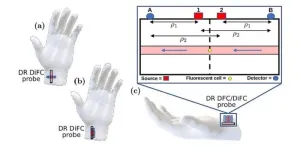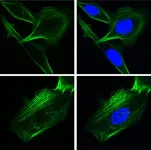(Press-News.org) Embargoed for release until 5:00 p.m. ET on Monday 24 July 2023
Annals of Internal Medicine Tip Sheet
@Annalsofim
Below please find summaries of new articles that will be published in the next issue of Annals of Internal Medicine. The summaries are not intended to substitute for the full articles as a source of information. This information is under strict embargo and by taking it into possession, media representatives are committing to the terms of the embargo not only on their own behalf, but also on behalf of the organization they represent.
----------------------------
1. ACP Says the U.S. Needs Immediate Action to Prepare for Future Pandemics
Abstract: https://www.acpjournals.org/doi/10.7326/M23-0768
Editorial: https://www.acpjournals.org/doi/10.7326/M23-1894
URL goes live when the embargo lifts
The United States has significant gaps in its pandemic and public health emergency response system leaving it unprepared for future emergencies, says the American College of Physicians (ACP) in a new policy paper. In the paper, ACP makes recommendations about what needs to be done to ensure the U.S. is in a strong position to mitigate the consequences of future pandemics. The paper is published in Annals of Internal Medicine.
ACP calls for a federal pandemic preparedness plan that is adequately funded and prioritizes health equity. They also ask that federal and state agencies provide consistent and timely communications about risk and strategies to combat risk in order to build trust and combat misinformation. They call for a national public health data infrastructure capable of real-time bidirectional data sharing among public and private public health stakeholders. The paper recommends securing and bolstering the health care supply chain. They also call for improved support for a health care workforce that is sufficient to provide surge capacity in emergencies, including the development of a reserve of physicians and other health care professionals. ACP affirms the importance of safety and well-being during emergencies, this must include safety for the public, patients and physicians and other professionals. The paper also calls attention to the need for support for medical practices during emergencies, measures to reduce infections in workplaces, and universal sick leave policies. Finally, ACP calls for expedited and equitable vaccine development and distribution, vaccine use in accordance with scientific recommendations, and ACP calls on physicians to promote vaccine uptake among their patients.
The recommendations need to be built on a strong public health sector, as outlined in an ACP paper recently published in Annals of Internal Medicine. Modernizing the United States’ Public Health Infrastructure: A Position Paper from the American College of Physicians, updates recommendations ACP made in 2012 for the U.S. public health infrastructure with new policies on establishing federal public health leadership, protecting public health workers, reversing workforce shortages, and the need to integrate primary care and public health.
An accompanying editorial by Ashish K. Jha, MD, MPH, former White House COVID-19 Response Coordinator, suggests that there are significant gaps to address in the American public health response to COVID-19 and future pandemics, but there are several key areas where there were successes to be improved upon for the future. Dr. Jha highlights the success of scaled and sustained pandemic-era innovations, including rapid testing and treatment mobile units and Operation Warp Speed. He also emphasizes the role of physicians and healthcare professionals as trusted sources of information to patients and the importance of professional organizations like ACP to lead physicians in speaking to patients exposed to medical misinformation. Finally, he argues for greater partnership between healthcare institutions and public health agencies, particularly focusing on greater data integration and the use of healthcare workers as a reserve for public health crises.
Media contacts: For an embargoed PDF, please contact Addison Dunlap at adunlap@acponline.org. To speak with someone from ACP, please contact Andrew Hachadorian at ahachadorian@acponline.org.
----------------------------
2. Statins underused for primary prevention of cardiovascular disease in racial, ethnic minorities and women
Findings suggest that factors within the health care setting may contribute to unequal treatment
Abstract: https://www.acpjournals.org/doi/10.7326/M23-0720
URL goes live when the embargo lifts
An analysis of persons eligible for statin use to prevent atherosclerotic cardiovascular disease (ASCVD) found disparities in the prevalence of statin use for primary or secondary prevention of ASCVD among racial and ethnic minorities and women. According to the authors, these disparities were not explained by measurable differences in disease severity or access to resources, and instead suggest that factors within the health care setting, including bias, stereotyping, and mistrust, contribute to unequal treatment. The analysis is published in Annals of Internal Medicine.
Although statins are a class I recommendation for prevention of ASCVD and its complications, their use is suboptimal. The consequences of underutilization of statins may contribute to disparities in cardiovascular health outcomes. Understanding racial, ethnic, and gender-based differences in statin use could inform strategies to improve population-level ASCVD outcomes. However, the current literature presents estimates of statin-use disparities derived from heterogeneous populations.
Researchers from the University of Pittsburgh’s School of Medicine and School of Public Health and the VA Pittsburgh Healthcare System conducted a cross-sectional analysis of data from the National Health and Nutrition Examination Survey (NHANES) of persons eligible for statin therapy based on 2013 and 2018 American College of Cardiology/American Heart Association blood cholesterol guidelines. The authors used the Institute of Medicine framework for examining unequal treatment and calculated adjusted prevalence ratios (aPRs) to estimate disparities in statin use adjusted for age, disease severity, access to health care, and socioeconomic status relative to non-Hispanic White men. The authors found a lower prevalence of statin use for primary prevention among non-Hispanic Black men and non-Mexican Hispanic women compared with non-Hispanic White men. They also found a lower prevalence of statin use for secondary prevention for non-Hispanic Black men, Other/Multiracial men, Mexican American women, non-Mexican Hispanic women, non-Hispanic White women, and non- Hispanic Black women compared with non-Hispanic White men.
Media contacts: For an embargoed PDF, please contact Addison Dunlap at adunlap@acponline.org. To speak with the corresponding author Ravy K. Vajravelu, MD, MSCE, please contact Wendy Zellner at zellnerwl@upmc.edu.
----------------------------
3. Patients with diabetes and gout may benefit from treatment with SGLT2is
Abstract: https://www.acpjournals.org/doi/10.7326/M23-0724
URL goes live when the embargo lifts
A study of persons with gout and type 2 diabetes found that the use of sodium–glucose cotransporter-2 inhibitors (SGLT2is) may reduce recurrent flares and gout-primary emergency department (ED) visits and hospitalizations compared to treatment with dipeptidyl peptidase 4 inhibitors (DPP-4is). SGLT2is may also provide greater cardiovascular benefits in this population. The findings are published in Annals of Internal Medicine.
Gout is an increasingly common metabolic inflammatory disease. Suboptimal care of the disease is associated with recurrent flares, increasing ED visits, and hospitalizations. Gout flares have also been associated with an increased cardiovascular risk and many cardiometabolic comorbidities accompany gout, including type 2 diabetes, metabolic syndrome, chronic kidney disease, and cardiovascular disease. Interventions that can address both gout flares and cardiometabolic risk may be beneficial for many patients.
Researchers from Massachusetts General Hospital conducted a propensity score–matched, new-user cohort study of 8150 persons with both gout and type 2 diabetes. They found that the use of SGLT2is was associated with a 34 percent lower rate of recurrent gout flare compared to DPP-4is, and a 48 percent lower rate of flares requiring an ED visit or hospitalization. The authors also found that SGLT2i use was associated with a relative risk reduction of 31 percent for myocardial infarction. According to the authors, these findings suggest that SGLT2is could have a much-needed ability to simultaneously reduce the burden of recurrent gout flares and coronary sequelae in patients with gout and type 2 diabetes.
Media contacts: For an embargoed PDF, please contact Addison Dunlap at adunlap@acponline.org. To speak with the corresponding author, Hyon K. Choi, MD, DrPH, please contact HCHOI@mgh.harvard.edu
--------------------------------
4. Researchers describe case of tecovirimat-resistant mpox variant in patient with prolonged infection
Abstract: https://www.acpjournals.org/doi/10.7326/L23-0131
Authors from the Institute of Tropical Medicine, Nationalestraat, Antwerp, Belgium describe a case of tecovirimat-resistant mpox virus (MPXV) identified at the autopsy of a severely immunocompromised patient with prolonged disease. Tecovirimat, an antiviral used to treat severe mpox virus, has a low barrier to resistance, which makes this case particularly unusual. The case report is published in Annals of Internal Medicine.
A 53-year-old patient presented with severe symptoms of MPXV that had been present for several weeks. The patient had several co-infections including active HIV infection, chronic hepatitis B virus infection, latent syphilis, and anal Chlamydia. Oral tecovirimat was started 1 day after the confirmation of MPXV and the initial 2-week course was successful. However, the anorectal viral load remained high up to day 48 and detectable up to the end of follow-up. Retrospective MPXV sequencing of the anorectal samples revealed a dominant variant population. This mutation was associated with a 350-fold increase in the half maximal effective concentration of tecovirimat compared with typical virus.
According to the authors, this case confirms the potential rapid selection of resistant mutant virus during tecovirimat monotherapy and could be the first to study this phenomenon longitudinally. The rapid selection of resistance in this patient highlights the risk of tecovirimat monotherapy, especially in the context of prolonged disease and immunosuppression. In such cases, the authors advocate for surveillance for resistant variants, emphasis on immune reconstitution, monitoring of viral clearance, and strict adherence to infection prevention measures.
Media contacts: For an embargoed PDF, please contact Addison Dunlap at adunlap@acponline.org. To speak with the corresponding author, Koen Vercauteren, please email kvercauteren@itg.be.
END
ACP says the US needs immediate action to prepare for future pandemics
2023-07-24
ELSE PRESS RELEASES FROM THIS DATE:
Community health workers improved homebound care during pandemic
2023-07-24
SAN ANTONIO (July 24, 2023) — Staying healthy and connected was difficult for everyone during the COVID-19 pandemic, but especially so for homebound older patients and their caregivers. Fortunately, a program developed by the geriatrics and supportive care team of The University of Texas Health Science Center at San Antonio effectively integrated community health workers (promotores de salud in Spanish) into patient outreach to improve health. Thanks to the program, annual visits to older adults with type 2 diabetes, dementia and other health issues in underserved ...
Stretchy integrated electronics may be possible with sandwiched semiconductor
2023-07-24
UNIVERSITY PARK, Pa. — There’s a barrier preventing the advent of truly elastic electronic systems, the kind needed for advanced human-machine interfaces, artificial skins, smart health care and more, but a Penn State-led research team may have found a way to stretch around it.
According to principal investigator Cunjiang Yu, who holds is the Dorothy Quiggle Career Development Associate Professor of Engineering Science and Mechanics and of Biomedical Engineering at Penn State, fully elastic electronic systems require flexibility and stretchability in every ...
Water-scarce cultures value long-term thinking more than their water-rich neighbors do
2023-07-24
Water is the world’s most valuable natural resource. Although a human can survive weeks or even months without food, going as little as three days without water could spell the end. The effects of water scarcity aren’t limited to immediate survival situations, however. Recently published research in Psychological Science suggests that cultures from water-scarce environments tend to be more likely than cultures from water-rich areas to value long-term thinking and to scorn short-term indulgence.
“Individuals from historically water-scarce climates tend to be ...
New method for noninvasive detection of circulating tumor cells in blood
2023-07-24
Metastasis occurs when cancer cells acquire the ability to spread and form new tumors in different places in the body, usually by traveling within blood or lymph vessels. Since metastasis is a hallmark of advanced cancer and severely complicates treatment, its early diagnosis is essential. One way to do this is by looking for circulating tumor cells (CTCs) in blood samples.
However, CTCs can be very rare, and they might be completely absent in small blood samples despite being present in a patient’s bloodstream. To address this problem, researchers have developed a technique called diffuse in-vivo flow cytometry (DiFC). It involves labeling CTCs with ...
Colorado River Basin has lost water equal to Lake Mead due to climate change
2023-07-24
American Geophysical Union
Release No. 23-28
24 July 2023
For Immediate Release
This press release and accompanying multimedia are available online at: https://news.agu.org/press-release/colorado-river-basin-has-lost-water-equal-to-lake-mead-due-to-climate-change/
Colorado River Basin has lost water equal to Lake Mead due to climate change
A rapid rate of reductions in runoff associated with the Colorado Basin’s snowpack region, quantified here for the first time, is largely responsible for the water loss.
AGU press contact:
Rebecca Dzombak, news@agu.org +1 (202) 777-7492 (UTC-4 hours)
Contact ...
Beyond protected areas: Novel method shows promise for monitoring biodiversity on working lands
2023-07-24
New research led by Adam Dixon, a conservation scientist with the World Wildlife Fund, describes the successful pilot of a novel method to study how well grassland birds are faring on croplands. The study, published in Ecological Applications, looked at 44 pockets of non-crop vegetation in the gaps between crop rows and at the edges of fields on lands under intensive agricultural cultivation in Iowa. The study may serve as a model for monitoring wildlife on working lands more generally, which can include crop fields, cattle ranches, and logged forests.
The researchers analyzed satellite imagery data to determine each pocket's area and “texture,” ...
Is snacking bad for your health? It depends on what and when you eat
2023-07-24
Snacking is becoming increasingly popular, with more than 70% of people reporting they snack at least twice a day. In a new study involving more than 1,000 people, researchers examined whether snacking affects health and if the quality of snack foods matters.
“Our study showed that the quality of snacking is more important than the quantity or frequency of snacking, thus choosing high quality snacks over highly processed snacks is likely beneficial,” said Kate Bermingham, PhD, a postdoctoral fellow at King's College London. “Timing is also important, with late night snacking being unfavorable for health.”
Bermingham ...
One way to reduce medical errors? Connect doctors with other doctors
2023-07-24
We trust our doctors with our lives, but the sad and scary fact is that doctors can get things wrong. Approximately 100,000 Americans die each year due to medical errors and recent studies have found that 10 to 15% of all clinical decisions regarding patient diagnosis and treatment are wrong.
A team of researchers led by Damon Centola, Professor and Director of the Network Dynamics Group at the Annenberg School for Communication at the University of Pennsylvania, has found a simple, effective way to reduce errors in patient diagnosis and treatment — use structured networks to connect clinicians with other clinicians.
In a study published today in the journal ...
Study finds new, unexpected mechanism of cancer cell spread
2023-07-24
A surprising finding from USC reveals key details about how cancer cells metastasize and suggests new therapeutic approaches for halting their spread.
The research, supported by the National Institutes of Health, centers on a cellular chaperone protein known as GRP78, which helps regulate the folding of other proteins inside cells. Previous studies from the same team, led by Amy S. Lee, PhD, professor of biochemistry and molecular medicine at the Keck School of Medicine of USC, have shown that when cells are under stress (due to COVID-19 or cancer), GRP78 gets hijacked, allowing viral invaders to replicate, ...
Sahara dust can enhance removal of methane
2023-07-24
The study by Maarten van Herpen et al., entitled “Photocatalytic Chlorine Atom Production on Mineral Dust-Sea Spray Aerosols over North Atlantic,” was funded in part by the NGO Spark Climate Solutions. It incorporates a proposed new mechanism whereby blowing mineral dust mixes with sea-spray to form Mineral Dust-Sea Spray Aerosol (MDSA).
The results suggest that MDSA is activated by sunlight to produce an abundance of chlorine atoms, which oxidize atmospheric methane and tropospheric ozone via photocatalysis. Largely composed of blowing dust from the Sahara Desert combined with sea salt aerosol from the ocean, MDSA is the dominant source of atmospheric ...






